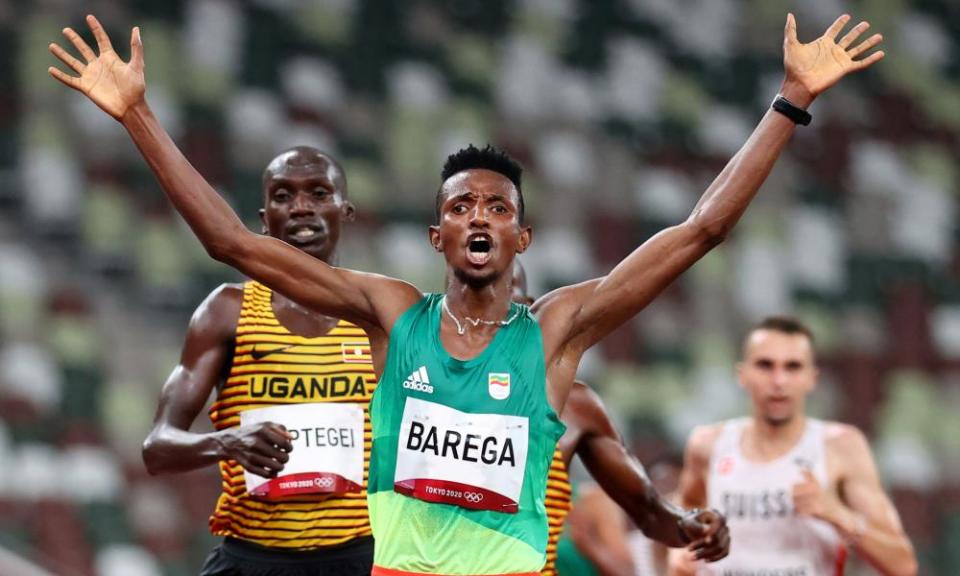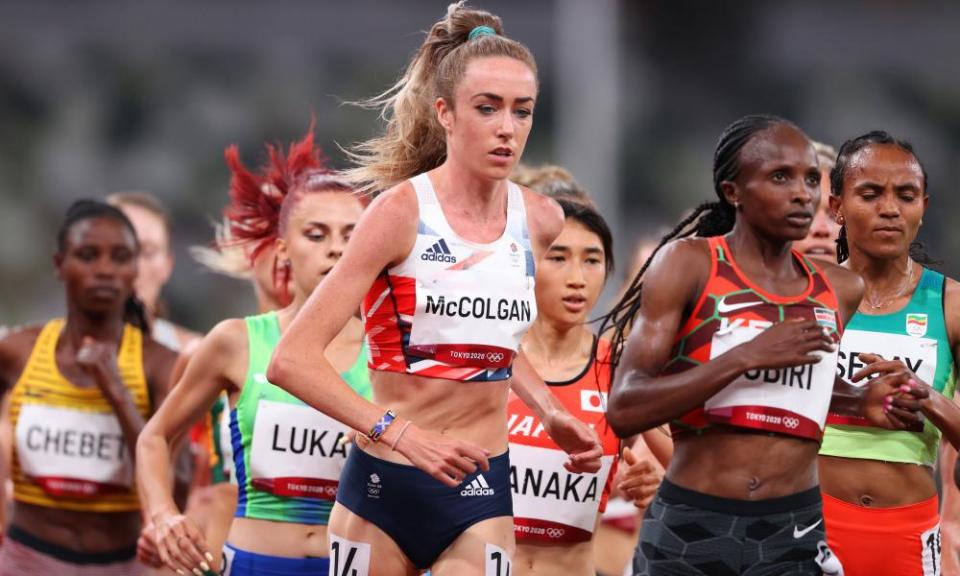Barega wins first Tokyo athletics gold on opening night of tears and drama

The first night of Olympic athletics opened with a big screen video montage of Usain Bolt’s greatest moments. It was an odd choice, another reminder of something else the competition was missing, along with the 60,000-odd fans. Their absence, on top of what was a pretty limited programme of events, made the occasion feel distinctly underwhelming.
Still, there was an Olympic debut for a new event, a little drama, caused by a handful of disqualifications, a first gold medal, won by Ethiopia’s Selemon Barega in the men’s 10,000m, one astonishing run by the Netherlands’ Sifan Hassan in the women’s 5,000m, and, this being the Olympics, a sprinkling of tears, too.
Related: Tokyo 2020 Olympics: athletics blasts off, Djokovic beaten and more – live!
Barega won the 10,000m in 27min 43.22sec. He took advantage of some strange tactics by the Ugandan trio of Stephen Kissa, Jacob Kiplimo and the world record holder, Joshua Cheptegei. Kissa took the race out with such gusto that he had a 10-second lead over the rest of the field after the first four laps. He stayed in front until he finally dropped out, spent, after 6,000m. He explained later he was trying to sacrifice himself for his teammates, but for some reason they decided not to go with him. “I thought they were going to follow me,” Kissa said, “but I looked around and they weren’t there.”
Cheptegei took the race on after Kissa dropped out but ended up jostling with Kiplimo down the back straight as they took turns trying to chase down Barega, who had streaked past both of them on the penultimate lap. Cheptegei said later that he had been struggling with a tendon injury, and that he didn’t want to risk aggravating it for something as trivial as an Olympic gold medal. “I was just saying that maybe I need to consider health first rather than to break myself and go out for a long time.”
The tears were shed earlier on, by Great Britain’s Eilish McColgan, who finished a disappointing 10th in the second heat of the women’s 5,000m. McColgan broke the British record in the event back at the start of the month, when she ran 14min 28.55sec at the Diamond League in Oslo, and was planning to do it again in the final here. But she was spiked by another runner on the penultimate lap, stumbled and never recovered.
“Every single 10 metres I was getting clipped and clipped and clipped,” McColgan said, “and I was saying: ‘Stop, stop, stop.’ I think I even swore at one point. And even [Gudaf] Tsegay, the Ethiopian, was saying: ‘Stop, stop, stop,’ because I think they were clipping her as well.

“But I felt good, it wasn’t like I was struggling, and I thought: ‘Right, we’ve got 800m to go here, just get into next gear,’ and then with 600m to go the girls came around me, I got clipped once, panicked, and then got clipped three times, and mentally I just lost it, that last 600m it was like I was trying to run a marathon, my legs had totally gone. And at that point you’re just so disappointed because you can see that your Olympics is slipping away.”
Related: ROC’s Olympic successes mean ‘absent’ Russia are more present than ever | Barney Ronay
McColgan finished in 15:09.68. “If someone told me that would be my time I’d have thought I’d have lost a leg,” she said. “I felt like I could finish in the top five, and that would have been a great achievement for me, so to be so far off that, I’m just so upset, and I really feel like I’ve let my family down, because they’ve just put so much into this.”
McColgan was not the only athlete left distressed by the race: Burundi’s Francine Niyonsaba thought she had qualified for the final, then found out she had been disqualified while she was doing her press interviews. “No, no, no,” Niyonsaba repeated, in disbelief.
It was a cruel blow. Niyonsaba won silver in the 800m behind Caster Semenya at Rio in 2016 but was forced to moved up to the longer distance because she is intersex and World Athletics have ruled that that means she and other athletes like her have an unfair advantage in races between distances of 400m and one mile. The only way Niyonsaba would have been allowed to compete at her favourite distance is if she had taken measures to restrict her naturally high testosterone levels. She chose to switch events instead.
It was not the night’s only disqualification. The USA, favourites for the mixed 4x400m relay, were eliminated after they botched a baton handover. They had not had much of a chance to practise, because of Covid restrictions, but did not make an excuse of it. “We come out and we got as prepared as possible,” said Elija Godwin. “Mistakes happen, we are human, we can make mistakes and if at the end of the day we get disqualified, I’ll hold my head up high because I know we competed our best.”
Then there was Hassan, who took the night in her stride. She ambled along at the back of the pack, then sprinted through to first place on the last lap, and finished in 14min 47.89sec. Hassan is attempting an audacious treble at these Games, in the 1500m, 5,000m and 10,000m. Like pretty much everyone else on the night, she struggled with the extreme heat and humidity; the difference between her and the rest was that unless she had said it herself you would never have guessed.

 Yahoo Movies
Yahoo Movies 